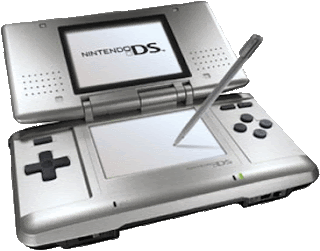Do we actually need them and will they make money for the developers and the game industry, this piece comes of the back of the negativity garnered by the general release of the PS Vita (the low sales etc.). What are the problems that handheld consoles face in the modern market and is there anyway they can be successful?
In theory handheld game consoles are perfect, you finish up playing on your own console and you just take your portable with you and carry on playing, sounds perfect right? but yet the sales and critical response to handhelds have been bad and they are often criticised, at the time of writing this the PS Vita has not yet been released in the UK so I am going to base the Sony side of my argument on the PSP and what we know to be fact about the PS Vita.
 |
| Original DS |
Nintendo's main rival in the handheld market was released 1 September 2005 and was called the Play Station Portable (PSP) and from there on developed one of the least successful handhelds in gaming history, many gamers were fooled into day one purchases by the promise of popular franchise' releasing their top games for PSP and also PSP special editions of these games along with a unseen level of graphical fidelity on a portable console. The first problem that the PSP had was its ridiculously high launch price (a problem with all of Sony's consoles) the first PSP base model launched for around £180, although this didn't initially hinder the success of the console as it proceeded to sell out in most UK stores, but the price of the console was only a small problem compared to the prices of the games, the game prices for the original PSP could be compared to that of Sony's home console the PS3, which leads onto the question, why would you buy a game for the PSP then? and that is the question that doomed the PSP from the start.
 |
| Can the Vita stay up with the 3DS |
The main problem with handhelds is that they are not better than home consoles but still are as expensive, the price for the new Uncharted PS Vita exclusive is 37.99 which is around the same price Uncharted 3 was when it was released for PS3, so why would you buy the Vita edition which won't be as good, the price is one of the biggest challenges facing handheld game consoles, which is largely down to the price of iPhone games.
So we return to the main question, can handheld consoles be a success? will the 3DS and PS Vita return the concept of handhelds back to glory? well with the initial low sales of the 3DS and poor performance by the Vita in Japan it might be a long time before we see handhelds regain their former glory.

 Logging you in...
Logging you in...
No comments:
Post a Comment